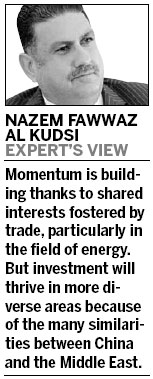Opinion
Investment, the missing thread on 'Silk Road'
By Nazem Fawwaz Al Kudsi (China Daily)
Updated: 2010-05-26 10:59
 |
Large Medium Small |
When my home country, the United Arab Emirates, welcomed two Chinese naval ships for a port call this year - the first such visit in modern history - parallels were drawn with Admiral Zheng He's voyages to the Arabian peninsula, which heralded the rise of China's international influence in the early 1400s.
The seafarer from Yunnan province, who grew up speaking Arabic and Chinese, caused a sensation when he landed in what is today Yemen, with 19 ambassadors from across the region traveling to board his ships with gifts for Emperor Yongle.
Some 600 years later, relations between China and the Arab world are on the ascent again.

Rapid growth in trade in the last decade has prompted talk of a new "silk road" - land and sea routes established over 2,000 years ago, which carried goods, culture, language, art and religion between East Asia and the Middle East.
Now, I believe, the focus will turn to increasing two-way investment to complement trade flows.
With free trade talks underway between the six-country Gulf Cooperation Council (GCC) and China, trade is set to more than triple to at least $350 billion by 2020, according to consultants McKinsey.
China recently overtook the United States as the biggest exporter to the GCC, with annual exports to the region growing more than 10-fold to over $60 billion in the last decade, as population growth and rising incomes fuelled demand.
In return, the GCC countries supply 35 percent of China's crude oil imports, with more than half of that coming from Saudi Arabia.
But as an example of how investment has so far lagged trade, China accounted for only 4 percent of foreign direct investment in Saudi Arabia in 2008 - the biggest and most populous economy in the Gulf.
And Middle East investors, increasingly active globally in recent years, still lie far behind the likes of Japan, South Korea, United States and Germany as sources of direct investment in China, partly because traditionally they have not been active in the manufacturing sector.
However, the landscape is changing, as Chinese and Middle East investors begin to seize on new opportunities.
That is why the chairman of Abu Dhabi's Department for Economic Development and several executives from the emirate will be meeting high-level Chinese officials and institutions at the Abu Dhabi and China Investment Forum in Shanghai next week.
Momentum is building thanks to shared interests fostered by trade, particularly in the field of energy. But investment will thrive in more diverse areas because of the many similarities between China and the Middle East. A high degree of understanding tends to reduce the "screening costs" involved in evaluating an investment and facilitates decision-making.
Abu Dhabi firms such as Invest AD can offer co-investment opportunities, not just in the UAE but across the Middle East and Africa.
The kind of venture capital opportunities that have brought private equity investors flocking to China, also abound in the Middle East.
And even the way business deals are done - relying on trust and long-cultivated connections - is similar.
Fast growing companies are hungry for financing to capitalize on the vibrant Middle East economy, forecast to record growth of above 4 percent annually for the next four years. With bank lending still slow, and IPOs on hold, this is a great opportunity for private equity investors to help ambitious firms expand across the region, in the same way as Chinese brands are now making a name on the global marketplace.
New industries to the region, such as petrochemicals, low-cost airlines and financial services, are well represented on the Middle East's equities markets, which have outperformed the rest of the world so far this year.
And because the UAE, Jordan and Egypt have all signed agreements with China Securities Regulatory Commission, they are among some 40 markets open to Chinese investors through the Qualified Domestic Institutional Investor (QDII) scheme.
|
||||
As this happens, it is important that we widen our close relationship to include two-way capital flows, as we seek diversification in our investments - and, of course, the modern-day returns to match the treasures carried by Admiral Zheng He's flotillas.
Nazem Fawwaz Al Kudsi is chief executive of Invest AD, an Abu Dhabi government-owned investment company that offers private equity and listed equities funds, as well as co-investment opportunities in the Middle East and Africa.



